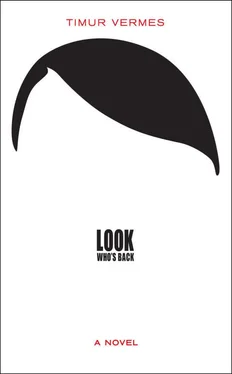“Won’t be enough,” I said dreamily.
“Now, now,” he laughed. “You’ve got plenty of time ahead of you. I can’t see any problems; you’re just going to have to be patient.”
“You really ought to report this to the police,” the nurse said.
“That would suit those villains down to the ground! What would Röhm have given to have been reported to the police?”
“I’m not your lawyer,” said the doctor with the Roumanian name. “But with injuries like this…”
“I shall strike back in my own way,” I coughed, and it occurred to me that rarely in my life had I uttered such an empty threat. “I’d rather you tell me how much longer you intend to keep me here.”
“A week or two, if there are no complications, maybe a little longer. Then you can recuperate properly at home and let everything fuse together again. Right now you should get some more sleep. And do think about telling the police, the nurse is absolutely right. I know you should turn the other cheek, but that doesn’t give people the right to administer beatings like that.”
“And have a think about your menu.” This was the nurse, showing me a list of meals. “We need to know what you’d like to eat during your stay with us.” I pushed the list away. “No special treatment. Simple soldier’s rations. Vegetarian. Like the Ancient Greeks.”
She looked at me, sighed, ticked a dozen or so boxes and gave me back the list. “You have to sign it.”
Feebly, I signed with the hand I could move. Then I passed out again.
I was standing at a bus stop in the Ukraine, holding a huge bowl of curd cheese.
Göring wasn’t there, and I remember just how much that irritated me.
I did, in fact, briefly consider reporting the matter to the police, but then dismissed the idea. It contradicted all my principles. The Führer cannot assume the role of victim; it is not right. He is not dependent on the intercession or assistance of such wretched characters as state prosecutors or police officials; he does not hide behind them, he grabs the law with his own fist. Or, rather, he offers it to the burning hands of the S.S. and then they grab it with their many fists. If I’d had an S.S. at my disposal this obscure “party headquarters” would have gone up in flames the very next evening and, within a week, each one of its cowardly members would have had the opportunity to ponder the true principles of the racial idea while bathed in a pool of their own blood. But from whom could I demand such brutality in these peaceable times, in which people had been weaned off violence? Sawatzki was a man for deft punchlines rather than punches; he worked with his brain, not his brawn. All I could do at this juncture was to defer the matter to an unspecified time in the future and take great care that no press photographer would have the opportunity to take some unfavourable pictures of me when I availed myself of the sanitary facilities at the hospital. The incident itself could not be kept secret, however, and only a few days later it was reported in the newspaper that I had been the victim of “far-right violence”. It was, of course, the usual journalistic incompetence to exalt these feeble-minded stooges as “far-right”, a label they did not merit. But every cloud has its silver lining, and within a few days, even hours, I had quite a number of extraordinary telephone exchanges with people to whom Fräulein Krömeier — at the suggestion of Herr Sawatzki and with his blessing — had given the number of my mobile telephone.
The first conversation, other than those with Flashlight colleagues wishing me a speedy recovery, was conducted with Frau Künast, who enquired about my well-being and wanted to know if I did actually belong to any party.
“Of course,” I said. “My own.”
Künast laughed and said that the N.S.D.A.P. was, for the time being at least, dozing or in hibernation. Until it awoke, she continued, I ought to consider whether the Green Party couldn’t offer a home to me, the man who had risked life and limb in opposition to right-wing violence. “At least for a while,” she said, repeating her invitation with a laugh.
I digested the telephone call with a shake of my head, and would most likely have dismissed it as another curious figment of the democratic–parliamentary imagination, had not another call come the following day along surprisingly similar lines. I had a gentleman on the telephone who, as I dimly recollect, was either just completing an apprenticeship as minister of health, or had already done so. Even after much thought I no longer recall his name; in any case I gave up trying to keep a track of this party long ago. After all, rumours are frequently aired on the relevant broadcasting slots that the only remaining elderly gentleman of the alliance is an out-and-out dipsomaniac. In my opinion this is unfair on the man; I rather take the view that it must be utterly impossible to last for even an hour in this bizarre game of political ring-a-ring o’roses without appearing inebriated.
The apprentice health minister told me how sorry he was about the assault. Especially on someone like myself who, as he put it, was a standard bearer for the broadest freedoms of opinion and speech, and needed all the support he could get at this difficult time. I scarcely had the opportunity to emphasise that the strong man is mightiest alone, for the apprentice was already insisting that he would do his utmost to ensure I was back on the television screen as soon as possible. For a moment I was terrified that he would take my treatment in his own notoriously soft-fingered and incompetent hands. Instead he asked me with feigned casualness about my party affiliation and I answered him truthfully.
The apprentice roared with boyish laughter. Then he said I was hilarious and suggested that as the N.S.D.A.P. was currently at rest in the graveyard of history, maybe the F.D.P. could become my new political home. I told him that he and his colleagues should finally stop insulting my party and that I had no interest of any sort in his crowd of liberal maggots. The apprentice laughed once more and said he loved it when I was like this; he could tell I would soon be my old self again. Before he hung up he promised to have an application for membership sent to me. Unsolicited. The telephone, it struck me at that moment, is the wrong means of communication for people without ears. And barely had I put the darned thing down than it rang again.
It turned out that the apprentice health minister and Künast the Green were by no means the only ones who had decided to put their own individual interpretations on my unflinching blood sacrifice. A number of callers from different parties congratulated me on my unequivocal championing of non-violence, which in their view was manifested by my demonstrative refusal to resort to self-defence. These callers included a man from the only grouping whose name aroused any sympathy in me: the Animal Protection Party. I had a very pleasant conversation with this fellow, during the course of which he generously brought my attention to some atrocities perpetrated against Roumanian street dogs, which were beyond belief. I resolved in the near future to devote particular attention to the outrageous goings-on in that country.
Recent events were also interpreted quite differently in the eyes of those “professional” politicians. The “Solidarity Civil Rights Movement” declared me to be a fellow sufferer of their party founder Larouche, who had been persecuted somehow or other. Meanwhile, a strange foreigners’ party by the name of B.I.G. assured me that in a country where the beating up of foreigners was outlawed, the beating up of Germans was, of course, outlawed too, to which I gave the emphatic response that I should not wish to live in a country where the beating up of foreigners was outlawed. This produced another outburst of raucous laughter at the other end of the line. For others I was not a symbol for freedom of opinion, but against it, at least against the wrong opinions; I was not only regarded as a champion against violence, but by several parties as a champion for it (C.S.U., two gun clubs and a manufacturer of firearms) and once as a victim of violence against the elderly (the Family Party). I was particularly struck by the dilettantism of an appeal by the Pirate Party, which thought it had identified in my refusal to press charges a protest against the surveillance state. It saw me as an advocate of extreme independence from the state and what they termed “total pirate thinking”. Those that came closest to the truth were a grouping called “The Violets”, who saw in my case evidence of a world beyond the purely materialistic, and in me a man who “under the banner of total peaceableness had subjected his return to the harshest tests with the greatest possible forbearance”. I laughed for so long that I had to ask for extra painkillers for my ribs.
Читать дальше












